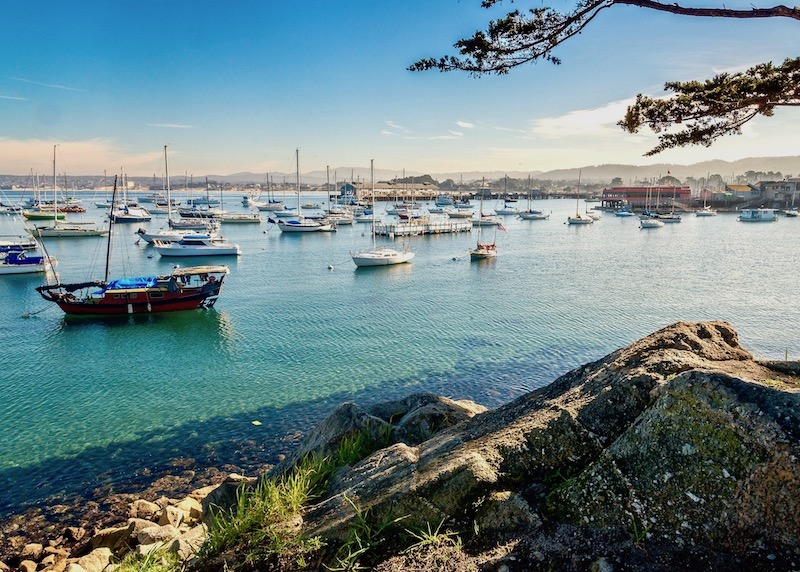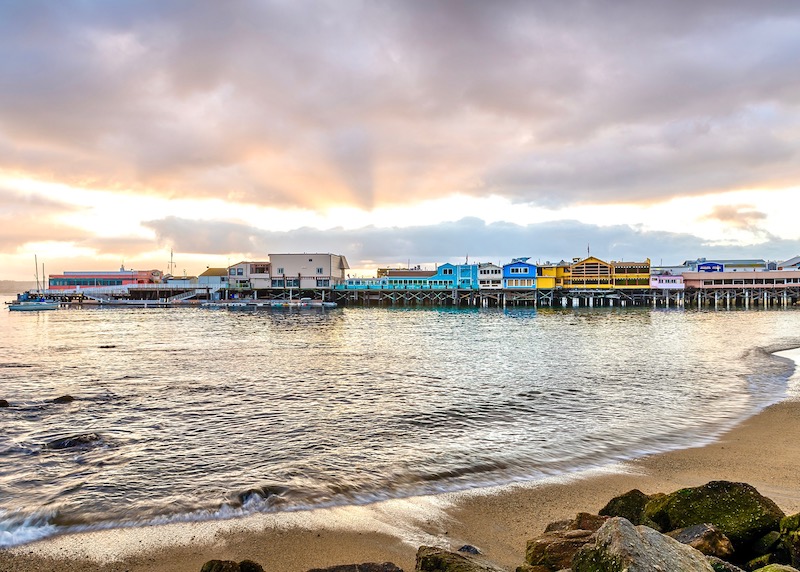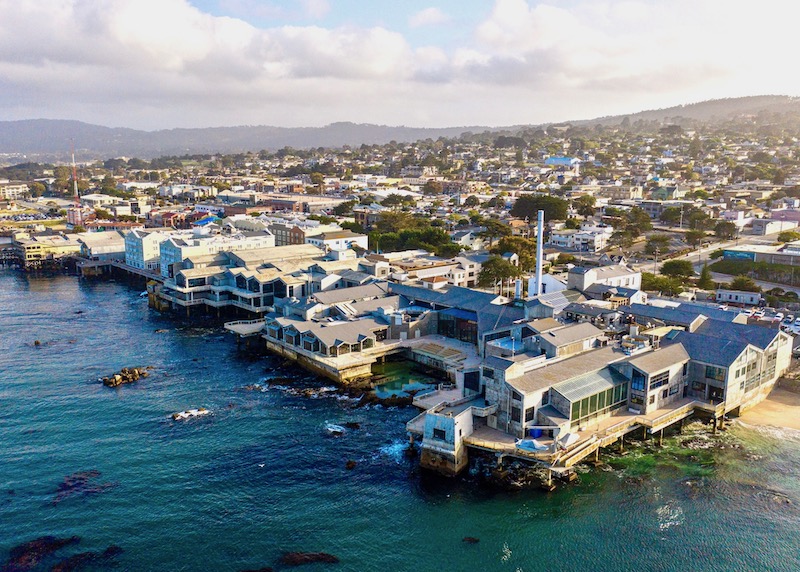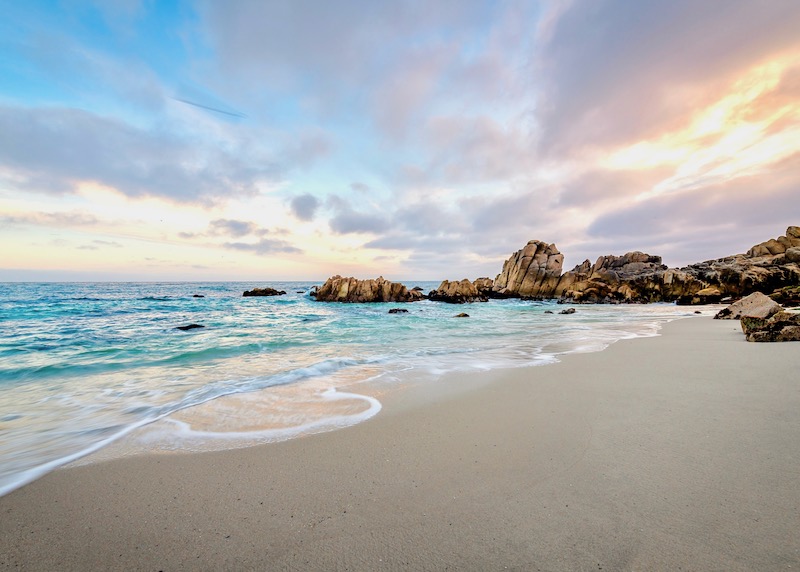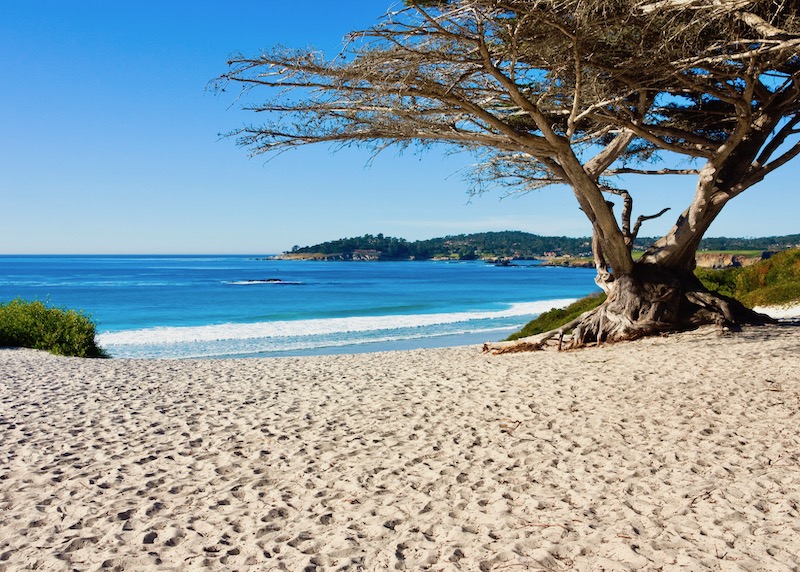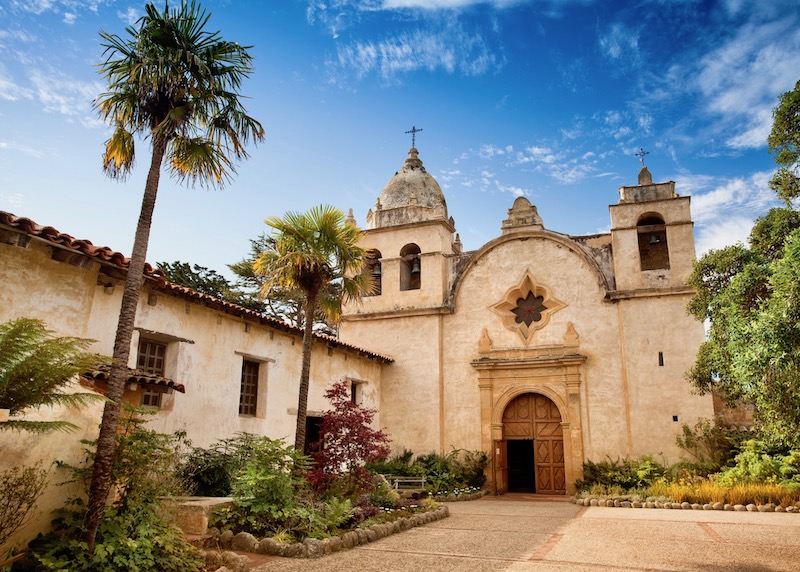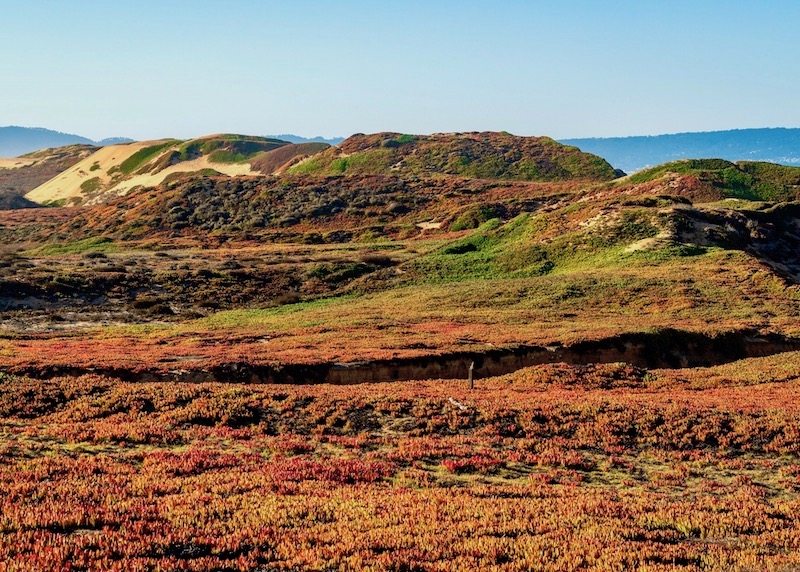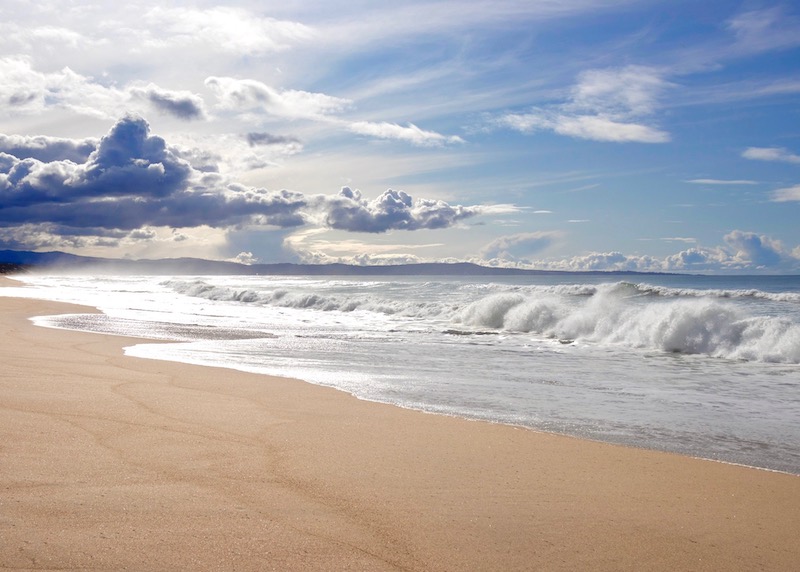By Seattle Dave
Our Favorite Monterey Hotels
• 5-Star Hotel: Monterey Plaza Hotel & Spa
• Midrange Hotel: Seven Gables Inn
• Cheap Hotel: Sunset Inn
• Boutique Hotel: The Vagabond’s House
• Bed & Breakfast: Jabberwock Inn
• Family Hotel: Carmel Valley Ranch
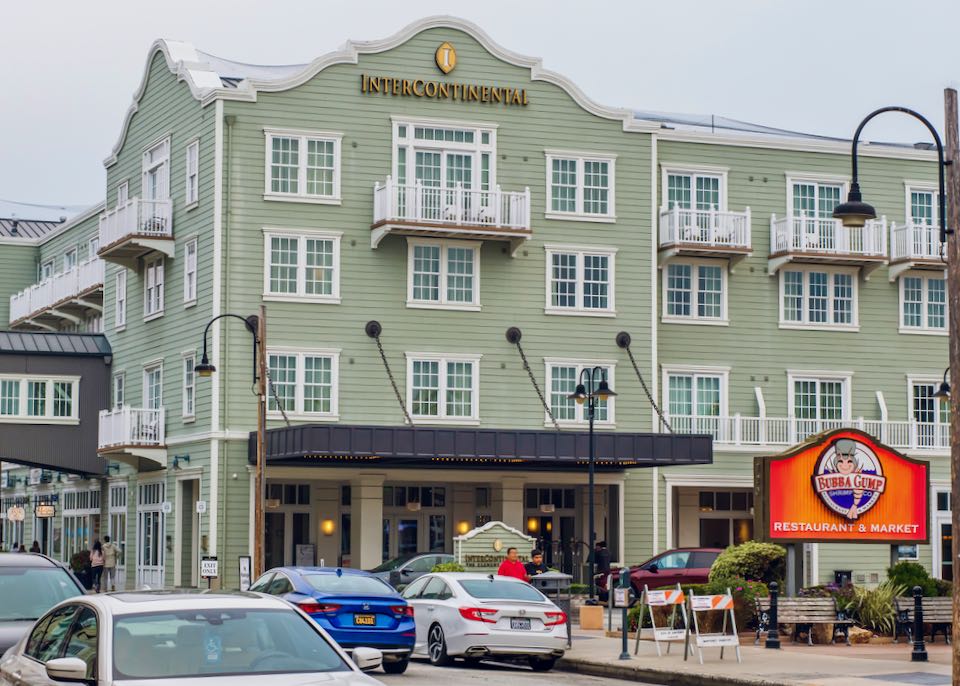
The InterContinental the Clement on Cannery Row in Monterey.
The Best Areas to Stay in Monterey
The forested Monterey Peninsula, on California’s central coast, is known for its diverse marine life, rugged coastline, and rich history dating back to the Spanish settlement of the 1770s. The largest city, Monterey is nestled at the south end of Monterey Bay, one of the few places in the world where whales can be spotted year-round – especially gray and humpback whales. Fronted by an enormous underwater canyon, Monterey is also an ideal place for spotting marine mammals including elephant seals, sea otters, and bottlenose dolphins, among others.
Downtown, including the original Spanish colony of Old Monterey, is the cultural and historic heart of the city, where you’ll find the landmark Fisherman’s Wharf and the San Carlos Cathedral, along with the museums, fantastic seafood restaurants, and a long sandy beach. Heading north from Downtown is New Monterey, including Cannery Row, (made famous by John Steinbeck), its numerous warehouses now converted into shops and restaurants. New Monterey is home to the Monterey Bay Aquarium, widely recognized among the best aquariums in the world with over 200 exhibits highlighting local species and habitats.
Along the bay to the east are the smaller towns of Sand City and Marina, offering pristine beaches and fabulous sunsets with the incredible Fort Ord Dunes State Park separating the two communities. Pacific Grove is perched at the northernmost point of the peninsula. A quieter space away from Monterey’s tourist throngs, Pacific Grove offers a relaxed, local-style stay with a handful of great restaurants and shops along the main drag, plus two beaches and a historic lighthouse. On the south side of the peninsula, Pebble Beach is a seaside resort with eight golf courses, best known for the scenic 17-Mile Drive. Immediately south of Pebble Beach is picturesque Carmel-by-the-Sea, founded as an artists’ colony, now an affluent town filled with high-end restaurants, art galleries, and designer boutiques. Highlights of Carmel include its delightful architecture (from Spanish missions to fairytale cottages), Point Lobos State Natural Reserve (with miles of hiking trails and top-notch scuba diving), and the stunning white sands of Carmel Beach.
The Best Places to Stay in the Monterey Peninsula
- Best Luxury Hotels in Monterey
Monterey Plaza Hotel & Spa • L’Auberge Carmel • Casa Palmero • Carriage House Inn • The Inn at Spanish Bay • InterContinental the Clement • The Lodge at Pebble Beach • Portola Hotel & Spa- Best Boutique Hotels in Monterey
The Vagabond’s House • Hotel Abrego • Tradewinds Carmel • Spindrift Inn • Cypress Inn • Tickle Pink Inn- Best 3-Star/4-Star Hotels in Monterey
Andril Fireplace Cottages • Seven Gables Inn • Carmel Cottage Inn • Casa Munras • Holiday Inn Express Monterey-Cannery Row • Monterey Bay Inn- Best Cheap Hotels in Monterey
Sunset Inn • Butterfly Grove Inn • Colton Inn • Munras Inn • Sand Castle Inn- Best B&Bs in Monterey
Jabberwock Inn • Carmel Garden Inn • Centrella Inn • Martine Inn • Old St Angela InnBest Neighborhoods in the Monterey Peninsula for…
View from the harbor in New Monterey’s Cannery Row toward Old Monterey and Fisherman’s Wharf.
- Best Neighborhood to Stay for sight-seeing: Downtown/Old Monterey
Old Monterey is a relatively compact district littered with historic sights, most with Spanish origins and contained within Monterey State Historic Park. Stay here and you’ll be able to tour the Pacific House Museum, old Custom House, Old Whaling Station, First Brick House, Casa del Oro, Larkin House, Old Monterey Jail, and Colton Hall, host to the California constitutional convention of 1849. There’s also the Monterey Museum of Art, the Robert Louis Stevenson House (where the Scottish author lived in 1879), and the 18th-century San Carlos Cathedral (aka Royal Presidio Chapel). On the harbor, there’s the Fisherman’s Wharf of shops and seafood shacks, plus the Salvador Dalí Exhibition, and an easy coastal path to Cannery Row.- Most Romantic Neighborhood: Carmel-by-the-Sea
Carmel is crammed with luxurious, romantic boutiques and B&Bs, many housed in gorgeous, historic cottages. The town itself is one of the most charming in the region, its leafy streets lined with pretty homes, galleries, and shops, many hidden throughout the town’s courtyards and passageways. Carmel Beach is undeveloped and backed by cypress trees, especially romantic at sunset. You can also go wine tasting at one of the many urban tasting rooms in downtown Carmel or further up in the Salinas Valley vineyards. When it comes to eating, Carmel is home to gorgeous French restaurants Casanova and L’Escargot, plus Flying Fish Grill and Anton & Michel, tucked away in the elegant Court of the Fountains in downtown Carmel.- Best Neighborhood for Families: Cannery Row
Cannery Row is home to the region’s biggest family-friendly attraction, Monterey Bay Aquarium, which can easily fill the best part of a day. Also here is the Monterey Mirror Maze and a host of dazzling shops, galleries, and places to eat, from Ghirardelli Chocolate and Dippin’ Dots ice cream, and Doc Wenzel’s Old Time Portraits. You can rent bikes at Adventures By The Sea and cycle along the coast to Pacific Grove or Fisherman’s Wharf in Monterey, spotting seals or otters along the way, or you can rent kayaks at the same place.- Best Neighborhood for Food and Restaurants: Carmel-by-the-Sea and Marina
The whole Monterey region is known for good food, especially fresh seafood, plus some of the best Chardonnay and Pinot Noir on the West Coast. Carmel has a few advantages, however; it hosts two excellent farmers’ markets – one on Tuesday and one on Thursday – and some of the best French restaurants in the region, Casanova and L’Escargot, plus Aubergine, La Bicyclette, Le Soufflé, and many others. On the edge of town is Carmel Craft Brewing Company, while Clint Eastwood helped to restore lauded Mission Ranch Restaurant. There is also the historic Carmel Bakery, and justly popular Mission Bistro.
Marina on Monterey Bay deserves a shout out for its bargain ethnic restaurants, everything from El Salvadorean (El Salvadoreño Pupuseria) and Mexican (Las Cazuelas), to Thai (Siam Marina Thai Cuisine) and Korean (New Korea Restaurant).- Best Neighborhoods for Nightlife: Cannery Row and Downtown Monterey
Monterey isn’t especially known for nightlife, but Cannery Row is usually lively most nights, with over 20 bars featuring live music, karaoke and DJs all within stumbling distance of each other. Highlights include Segovia’s Tavern for its cocktails and dive bar vibe, and Schooners Coastal Kitchen & Bar for the views, and Sly’s Refueling Station for live music.
Downtown Monterey also has a small but decent line-up of bars, especially on Alvarado Street, led by British pubs such as Britannia Arms and the Crown & Anchor. Other favorites here include Alvarado Street Brewery and Peter B’s Brewpub.- Best Neighborhood for Shopping: Carmel-by-the-Sea
Carmel wins out again when it comes to shopping, with almost 100 artists maintaining galleries and studios in the city, and the center studded with family-owned boutiques and specialty stores. On the outskirts stands the Barnyard Shopping Village, home to more than 50 small businesses, including several jewelry and art boutiques, while the nearby Crossroads is crammed with fashion boutiques and restaurants. In Downtown Carmel, Carmel Plaza is another high-end mall, containing Tiffany & Co, Kate Spade, Bottega Veneta, and more. Monterey itself features a more standard line-up of stores at Cannery Row and the Del Monte Shopping Center.- Best Neighborhood for Local Vibe: Pacific Grove
Pacific Grove is a good option if you want to escape the bulk of the Monterey tourist crowds, but want to remain close to the beach and the main eating and drinking spots. We like perusing the charming main drag, Lighthouse Avenue, stopping for a coffee at local bookshop, The Bookworks, then checking out the tide pools at Asilomar State Beach or having dinner with a view at Beach House Restaurant.- Unsafe Areas of Monterey
Monterey and most of the peninsular is quite safe, though the usual precautions should be taken at night, especially in Sand City, where crime is generally higher than in the surrounding areas.The 7 Best Neighborhoods in Monterey for Tourists
1. Downtown/Old Monterey
Downtown Monterey is the region’s commercial heart, with the main drag along Alvarado Street lined with restaurants and stores. This neighborhood is primarily known, however, for its history
and its harbor. Downtown actually extends half a mile inland from the waterfront and docks on Monterey Bay, encompassing Old Monterey, the original Spanish settlement, with many of its historic buildings preserved in Monterey State Historic Park. Other highlights include the Monterey Museum of Art, and the elegant San Carlos Cathedral (Royal Presidio Chapel), completed by the Spanish in 1795. There’s more history at the Presidio of Monterey Museum, the old Spanish fortress that looms over Downtown. The main focus on the waterfront is Fisherman’s Wharf, lined with multicolored shacks converted into shops and restaurants – you can also take whale-watching tours from the docks. Near here stands the Salvador Dalí Exhibition, Custom House, and Pacific House Museum. Staying in Downtown Monterey means having easy access to the city’s most historic sights and Fisherman’s Wharf, plus a decent range of bars and restaurants. Cannery Row is a short ride away. Hotel options in the heart of Downtown are quite limited – most of the motels and chain hotels line Munras Avenue, just to the south, all the way to Hwy-1. Most of these are a little far for walking, so you’ll still need to take a taxi or bus, or drive-in.
- Best Hotels: Casa Munras • Hotel Abrego • Merritt House Inn • Monterey Marriott • Portola Hotel & Spa
- Best Cheap/Midrange Hotels: Colton Inn • Monterey Hotel • Stevenson Monterey
- Best Hotels on Munras Avenue: Best Western Park Crest Inn • Villa Franca Inn • Munras Inn
2. Cannery Row/New Monterey
The neighborhood of New Monterey, a mile or so northwest of Downtown, is best known for Cannery Row. This waterfront strip, previously named Ocean View Avenue, was once lined with around thirty fish-canning factories (it was dubbed the “sardine capital of the world”) – it was renamed after John Steinbeck’s 1945 novel Cannery Row, in which he depicted dockside life here. Today, the main strip between Hoffman and David streets has been completely converted into chain restaurants and stores (like Bubba Gump Shrimp), and even a Steinbeck Wax Museum. It’s a touristy but fun place to hang out, especially at night, when it’s one of the liveliest streets in the region. Its chief attraction is the spectacular Monterey Bay Aquarium, one of the largest in the world. Staying here can be fun for families, and there are plenty of luxurious hotels overlooking the water, though very touristy, and beyond the main strip there’s not much to do. It’s a pleasant stroll along Monterey Coastal Trail to Fisherman’s Wharf, and the free MST trolley bus (running daily from Memorial Day to Labor Day) also connects the two parts of the city. You’ll need to drive everywhere else.
- Best Hotels: Monterey Plaza Hotel & Spa • InterContinental the Clement • Jabberwock Inn • Monterey Bay Inn • Spindrift Inn
- Best Midrange Hotels: Holiday Inn Express Monterey-Cannery Row
3. Pacific Grove
Around one mile west of Cannery Row lies Pacific Grove (aka “P.G.”), which has a wholly different feel to both New and Old Monterey. Gone are the touristy shops and Spanish colonial remnants: P.G. is a relatively quiet, affluent neighborhood, its streets lined with pine trees and grand old Victorian wooden homes. It’s best known for being “Butterfly Town, USA.” Hundreds of thousands of orange-and-black monarch butterflies migrate here each winter from all over the western US and Canada, best observed at the Monarch Butterfly Sanctuary (organized by the Pacific Grove Museum of Natural History). Downtown Pacific Grove is centered along Lighthouse Avenue between 12th and Congress, where there are relaxed cafés, seafood restaurants, and stores. P.G. also encompasses Asilomar State Beach and Lovers Point Beach, ideal spots for kayaking or surfing, as well as 19th-century Point Pinos Lighthouse, the oldest continuously operating lighthouse on the West Coast. Pacific Grove is a more refined, less touristy alternative to Monterey, with a rugged, unspoiled coastline and a decent selection of restaurants and shops. The main choices here are B&Bs and self-catering cottages, with only one or two chain hotels. You’ll need a car to get around as things are spread out, though it is possible to walk along the coast to Cannery Row.
- Best Hotels: Andril Fireplace Cottages • Old St Angela Inn • Seven Gables Inn • Centrella Inn • Martine Inn
- Best Cheap/Midrange Hotels: Sunset Inn • Butterfly Grove Inn • Sea Breeze Inn
4. Pebble Beach
Much of the Monterey Peninsula south of Downtown and Pacific Grove falls within the upscale gated community of Pebble Beach, managed by the Pebble Beach Company. For visitors, the biggest draw here is historic 17-Mile Drive, which originated as a carriage road in the early 1880s. Today the privately-run toll road snakes along an exceptionally scenic section of the peninsula coast, taking in the iconic Lone Cypress on the way. It’s also known for its luxurious resorts, and golf courses: seven 18-hole (plus the 9-hole Peter Hay Golf Course), including the celebrated Pebble Beach Golf Links. Staying here is about luxury and peace and quiet; it’s also heaven for golf enthusiasts. You’ll need a car to get around; restaurant options are limited to the resorts.
- Best Hotels: Casa Palmero • The Inn at Spanish Bay • The Lodge at Pebble Beach
5. Carmel-by-the Sea and and Carmel Highlands
Exclusive Carmel-by-the-Sea (usually shortened to Carmel) features a fabulous beach, numerous boutiques, and galleries, some of the best restaurants in the region, and the Carmel Mission, established by the Spanish in 1770 and the resting place of lead missionary Junípero Serra himself. Carmel is also known for the election of actor Clint Eastwood as mayor in 1986. Founded as an artists’ colony, today it’s an extremely affluent community of gingerbread cottages and posh mansions, with the central business district focused on Ocean Avenue. It’s a popular place to go shopping, sprinkled with designer boutiques and art galleries, especially along Dolores Street. At the south end between Carmel-by-the-Sea and Carmel Highlands, you’ll find Point Lobos State Natural Reserve, often called the “crown jewel of the State Park System,” offering miles of hiking trails, world-class scuba diving, and a 19th-century Whalers Cabin, now a cultural museum. Carmel Highlands is home to some of the most expensive real estate in America with sprawling resorts nestled on the clifftops overlooking the wild coastline. Some of the best boutique hotels and B&Bs in California are in Carmel – staying here is as much about your hotel experience as the location. As a result, staying here is very expensive. You don’t need a car to explore Carmel, with plenty to do and see, and lots of restaurants, but you’ll need transport to venture further afield – it’s just over 4 miles to Downtown Monterey.
- Best Hotels: L’Auberge Carmel • Carmel Cottage Inn • Carmel Garden Inn • Carriage House Inn • Tradewinds Carmel • Cypress Inn • The Vagabond’s House • Carmel Valley Ranch • Hyatt Carmel Highlands
- Best Midrange/Budget Hotels: Candle Light Inn • The Getaway • Quail Lodge & Golf Club
6. Sand City/Seaside
Facing the bay around four miles northeast of Downtown Monterey, Sand City is a tiny seaside community best known for its huge, dune-lined shore. Inland it’s dominated by the Sand Dollar Shopping Center and major stores like Costco, though the southern section boasts craft beer specialist Post No Bills and Hale Kai Lana Kona coffee roasters, among several other indie businesses. The old factory district here has become an informal artists’ colony with some of the resident artists running galleries; check out Anderle Gallery. The dunes are the main attraction, though, the highest on California’s Central Coast and a magnet for paragliders (see Raven Wolf Sky Sports. Just to the north lies Fort Ord Dunes State Park, accessible via the Monterey Bay Coastal Recreation Trail. Sand City features primarily cheap hotels and old-fashioned motels (most of these technically fall across the border in the city of Seaside).
- Best Hotels: Hampton Inn Monterey • Sand Castle Inn
7. Marina
The small seaside town of Marina lies around 10 miles northeast from Downtown Monterey (6 miles from Sand City), facing Monterey Bay. It’s best known for its wild, undeveloped beach, backed by large dunes, especially popular with hang-gliders. The trails along the dunes in Marina State Beach attract walkers, cyclists, and kite enthusiasts, while Marina’s small downtown area offers cheap places to eat and drink. The beach also boasts some of the best sunsets in the region (being entirely west facing), a handful of cheaper golf courses, and Fort Ord Dunes State Park just to the south. Skydive Monterey Bay is based at Marina Airport. Staying at Marina you’ll need a car to explore the area, but it’s a much quieter, less touristy stretch of coast, with a good range of accommodation.
- Best Hotels: Sanctuary Beach Resort • SpringHill Suites The Dunes on Monterey Bay
- Best Cheap/Midrange Hotel: Howard Johnson by Wyndham Marina at Monterey Bay
